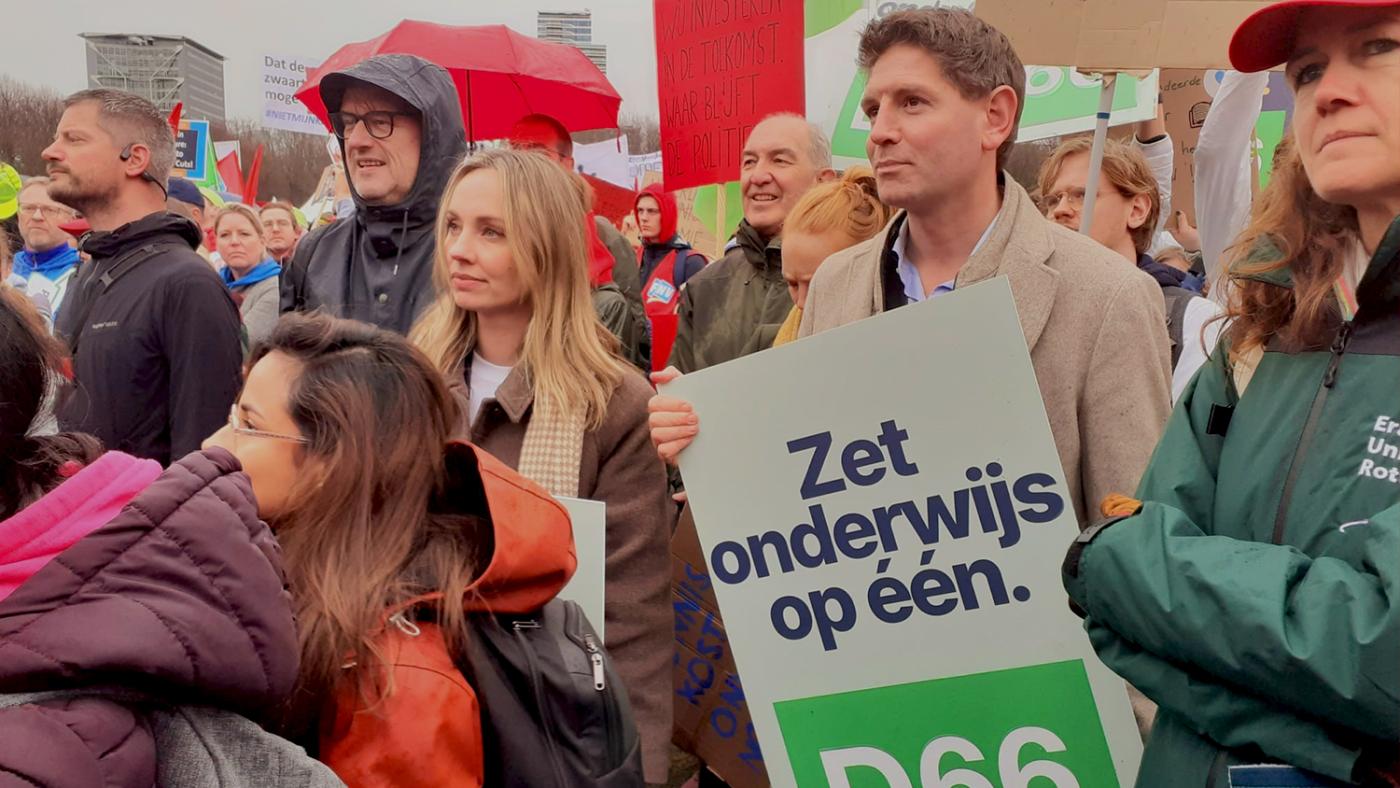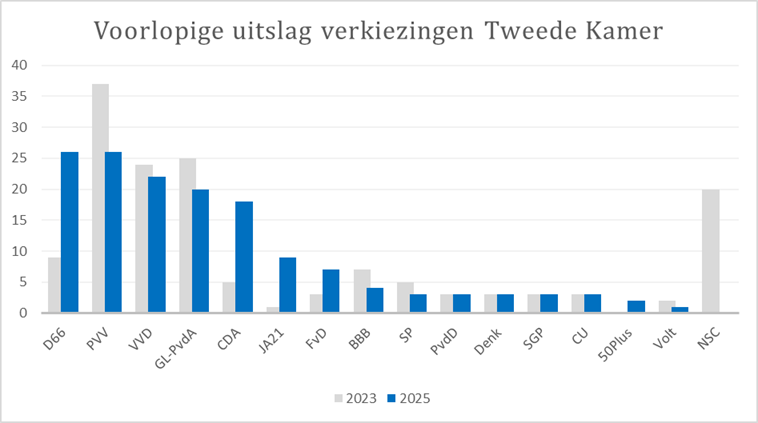Will D66 go left or right?
This is what the election results could mean for students and higher education

The preliminary election results show that the centre-left party D66 has won just as many seats as the far-right party PVV in the Dutch House of Representatives.
It remains to be seen who has won the vote, but for now, these two parties have 26 seats each. It is almost certain that D66 will form the government, putting PVV back in the opposition benches.
The damage to the right-wing VVD, which for a long time was the largest party in the Netherlands, was not too severe. They only lost a few seats, so there is a big chance they will be part of the next cabinet. VVD would like to reduce the budget for education and research even more, but without PVV in the government, the chances of this happening are very slim.

The preliminary results. Source: HOP.
It seems inevitable that D66 will form a coalition government with the Christian Democrats (CDA), another party that made significant gains yesterday. The main question is which parties will join them.
To the left or to the right?
A broad centre coalition featuring both the left-wing party GroenLinks-PvdA and the right-wing party VVD would secure a majority. However, it is unlikely that these two parties will want to work together. Perhaps they can put aside their mutual objections and form a cabinet with D66 and CDA after all.
Instead of VVD, D66 could approach the far-right party JA21 and another small party to try and form a centre coalition with GroenLinks-PvdA. This might not be unfavourable to higher education and research, as JA21 has opposed cuts to the education budget.
D66 can also form a right-wing coalition with CDA, VVD and JA21. Together, they would have 75 seats. One small party (such as ChristenUnie or BBB) would help them cross the threshold. Governing with the right would make policy less progressive than Rob Jetten and his party colleagues would like, though.
For students, universities and universities of applied sciences, the arrival of a cabinet led by D66 is good news. It remains to be seen what the parties will agree on exactly, but some outcomes can be predicted.
More student finance
D66 wants to increase the basic grant by 164 euros per month. This would cost around 600 million euros. GroenLinks-PvdA also wants to do this, but other potential coalition parties do not consider it necessary.
Compromises are up for grabs. For example, they could just increase the supplementary grant or the grant for students who do not live with their parents. It seems unlikely that nothing will happen with student finance.
A mandatory internship allowance
Three parties want to make it mandatory for employers to pay their interns: D66, GroenLinks-PvdA and CDA. So, there is a good chance that this obligation will be introduced.
VVD and JA21 are concerned that small businesses will stop hiring interns if such a bill were to pass. However, this can certainly be remedied with a special internship fund, which a majority in the House of Representatives is already in favour of.
More money for education and research
D66 wants to allocate over 5 billion euros in additional funding for education and research, in addition to spending on innovation via the Ministry of Defence, healthcare and the business community. GroenLinks-PvdA is considering 3 billion, and JA21 has reserved approximately 2 billion.
CDA is putting the brakes on, as that party has no extra money for education and research in its plans. But the Christian Democrats would accept if a D66 cabinet spent more money on this.
As mentioned, VVD wants to further reduce the education budget, but this does not seem to be a matter of life and death for them. The fourth Mark Rutte cabinet actually opened the money tap when VVD was the largest governing party.
What kind of research, though?
Heavy negotiations are still expected regarding the exact research expenditure. CDA and VVD would like to first assess how useful the research is for the labour market and society. JA21 also thinks along these lines.
D66 and GroenLinks-PvdA are obviously not opposed to applied research, but they also want to allocate more money to fundamental and curiosity-driven research, in which scientists themselves determine what they find interesting.
The outcome on this point? More funding for applied research at universities of applied sciences is obvious, and universities will likely receive more funding for research aimed at addressing social challenges. Additional money for fundamental science will then be compromised.
Diversity
The potential governing parties have very different views on diversity policy. Some consider the higher education sector too "woke", while others want to fight for equal opportunities. The most likely outcome of the negotiations is that they will agree to disagree.
They will probably not want to get burned by diversity officers, gender-neutral toilets, quiet rooms or the dismissal of activist lecturers in their coalition agreement, leaving this to university administrators.
Demonstrations
The same applies to the protests about the ties between universities and Israeli institutions. One party wants to take tougher action against rioters, while the other emphasises the right to demonstrate.
This leaves two obvious options. They can once again leave it to administrators, or they can say something along these lines: "We are going to make agreements with the universities about safety and freedom of demonstration at their institutions." And then we will see what those agreements will look like.
In short
The austerity measures proposed by PVV, VVD, NSC and BBB in the previous cabinet will be reversed. How quickly that will happen remains to be seen. After all, how much money will be added to the budget in the next term of office remains shrouded in mystery...
Will the far-right come to power after all?
There is another conceivable outcome. It is unlikely, but suppose that CDA changes course and decides to govern with PVV after all. In this case, things could suddenly take a pretty different turn, and D66 would be left behind.
PVV could even attempt to form a majority without CDA, comprising VVD, JA21, FvD, BBB, SGP, 50Plus, and perhaps one other small party such as ChristenUnie or Partij voor de Dieren. However, this seems an impossible task. It looks like PVV will remain on the sidelines.
Laten we eens mathematisch naar de verkiezingsuitslag kijken. Razend spannend? "Too close to call?" Welnee!
D66 ligt 15.000 stemmen voor op de PVV. Nog te tellen: Venray en de briefstemmers.
Venray is weliswaar een PVV-bolwerk, maar twee jaar geleden had de PVV daar 7300 stemmen en D66: 1500.
Dat verschil zal eerder kleiner worden, en dan ligt D66 dus nog steeds zo'n 10.000 stemmen voor. Met de briefstemmen zou PVV dat moeten goedmaken. Als de 100.000 briefstemmen net zo verdeeld zouden zijn als landelijk, krijgt elk daar zo'n 17.000 stemmen.
Het is erg onwaarschijnlijk dat hierbij een verschil van 10.000 wordt goedgemaakt. Daarbij: Nederlandse expats stemmen eerder D66 dan PVV, dus het verschil zal eerder groter dan kleiner worden. D66 wordt gewoon de grootste.
Wat wèl spannend is: wie krijgt de laatste restzetel?
Momenteel wordt die toegeschreven aan de SP, die daarmee op 3 uitkomt. Maar het is denkbaar dat deze restzetel naar D66 gaat, die dan toch op 27 zou uitkomen. Hoe dan?
De SP deed het vorige keer goed in Venray: met 4,9% beter dan de landelijke 3,2%. Dus dit jaar misschien zo'n 2,5%, dat is 650 stemmen. En in de briefstemmen: nulhypothese is 1,9% van 100.000 is nog eens 1900 stemmen, totaal zo'n 2500.
Als de SP in Venray+briefpost in plaats van 2500 stemmen echter minder dan 900 stemmen haalt, verliezen ze hun restzetel aan D66! Of ook: als D66 in plaats van de nulhypothetische 3000+17.000=20.000 nog 15.000 extra stemmen krijgt, gaat de restzetel naar hun.
Dit is allebei niet heel erg waarschijnlijk, maar een combinatie van deze scenario's kan ook: als de SP 800 stemmen verliest, en D66 7500 stemmen wint, gaat de restzetel ook naar D66.
Wat de andere partijen nog doen heeft voor de restzetelverdeling praktisch gesproken geen consequenties.
Dus dit is het enige wat we in de gaten moeten houden: expats die massaal D66 stemmen, in combinatie met een achterblijvende SP.
Dan zou D66 27 zetels krijgen, waarmee een rechtsom-meerderheid weer in zicht komt.
De droom van Yesilgöz ligt in handen van 800 SP-stemmers.